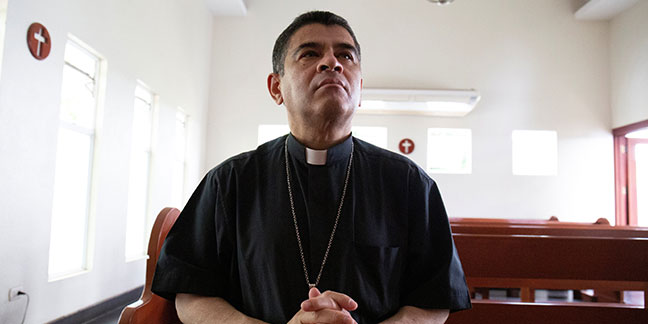 Bishop Rolando Álvarez of the Diocese of Matagalpa and Esteli, who has been critical of the Nicaraguan President Daniel Ortega, prays in May 2022 at a Catholic church in Managua, Nicaragua, where he took refuge, alleging he had been targeted by the police. He was arrested in August 2022 and in February 2023 was sentenced to 26 years in prison. (OSV News photo/Maynor Valenzuela, Reuters)WASHINGTON, D.C. — Conditions for religious freedom are "worsening" around the globe, a U.S. government body monitoring international religious freedom said in a recent report.
Bishop Rolando Álvarez of the Diocese of Matagalpa and Esteli, who has been critical of the Nicaraguan President Daniel Ortega, prays in May 2022 at a Catholic church in Managua, Nicaragua, where he took refuge, alleging he had been targeted by the police. He was arrested in August 2022 and in February 2023 was sentenced to 26 years in prison. (OSV News photo/Maynor Valenzuela, Reuters)WASHINGTON, D.C. — Conditions for religious freedom are "worsening" around the globe, a U.S. government body monitoring international religious freedom said in a recent report.
In its 2023 report, the U.S. Commission on International Religious Freedom identified "regression" last year in countries including Afghanistan, China, Cuba, Iran, Nicaragua and Russia. The annual report by the independent, bipartisan commission makes recommendations to the U.S. government for the promotion and protection of religious freedom abroad.
USCIRF recommended that the State Department designate 17 countries as "Countries of Particular Concern" due to governments that engage in or tolerate "systematic, ongoing, and egregious violations" of religious freedom. Twelve of those nations -- Burma (Myanmar), China, Cuba, Eritrea, Iran, Nicaragua, North Korea, Pakistan, Russia, Saudi Arabia, Tajikistan and Turkmenistan -- were designated as such by the State Department in November 2022. The report made five additional recommendations: Afghanistan, India, Nigeria, Syria and Vietnam.
"USCIRF is disheartened by the deteriorating conditions for freedom of religion or belief in some countries -- especially in Iran, where authorities harassed, arrested, tortured, and sexually assaulted people peacefully protesting against mandatory hijab laws, alongside their brutal continuing repression of religious minority communities," USCIRF Chair Nury Turkel said in a statement.
The report details difficult circumstances for some people of faith in those nations, such as China's "attempts to eradicate Uyghurs," human rights violations amid Russia's invasion of Ukraine including the suppression of some religious communities, and the regime of Nicaraguan President Daniel Ortega's persecution of Catholic leaders.
Stephen Schneck, USCIRF commissioner, told OSV News that "the situation for religious freedom or freedom of belief around the world is worsening."
"I liken it to a virus spreading around the world where religion is itself being weaponized and used in nationalistic and often authoritarian circumstances against other religions," Schneck said. "It's very worrisome to see this combination of religion and government working against the space in which religious freedom and freedom of belief have traditionally operated."
Threats to religious freedom, Schneck said, also present threats to democracy and human rights more broadly.
"You could think of religious freedom, for example, as like the canary in the coal mine for all of the rest of the human rights and for democracy itself, and that canary in the coal mine is not doing very well around the world right at the moment," said Schneck, a political philosopher now retired from The Catholic University of America in Washington, where he was the founder and longtime director of the Institute for Policy Research and Catholic Studies.
Praising the federal government's response to the persecution of Catholic leaders in Nicaragua, Schneck said the U.S. is responding correctly but should ramp up its efforts to include congressional hearings. He also called for a more vocal response from the Vatican.
"The Vatican, as always, is playing a long game in its foreign policy, and I understand, as always, that the Vatican would prefer to be operating behind the scenes, but I think that it would help the situation for the Holy See to speak out more publicly and more strikingly in its condemnation of the Nicaraguan government and what the Nicaraguan government is doing against Catholics in the country," he said.
The United States' role in protecting and promoting freedom of religion and belief across the globe, Schneck said, is not to "advance our own values, but rather to hold up the universal rights and values enshrined in international law established under the United Nations."
In a statement about the report, Turkel said the panel urges the Biden administration "to implement USCIRF's recommendations -- in particular, to designate the countries recommended as CPCs, and for the Special Watch List, or SWL, and to review U.S. policy toward the four CPC-designated countries for which waivers were issued on taking any action."
"We also stress the importance of Congress acting to prohibit any person from receiving compensation for lobbying on behalf of foreign adversaries, including those engaging in particularly severe violations of the right to freedom of religion of belief," Turkel said.
— Kate Scanlon, OSV News


